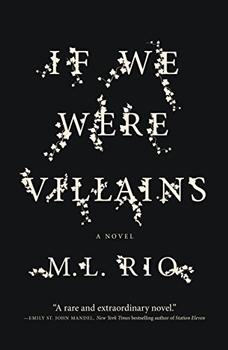Reading Guide Questions

Please be aware that this discussion guide will contain spoilers!
1. In the very first scene, Oliver says, "We did wicked things, but they were necessary, too - or so it seemed. Looking back, years later, I'm not so sure they were... and now I wonder: Could I explain it all to Colborne?" (page 5). Having finished the story, which of the "wicked" things do you think were necessary or inevitable? Which were not? What, in the last ten years, might have caused Oliver to change his mind?
2. Throughout the story the fourth-years perform four of Shakespeare's plays and quote the other plays and poems in their everyday conversation. Shakespeare's works - and especially the tragedies - are saturated with love, loss, jealousy, betrayal, and violence. How do these themes manifest themselves offstage? To what degree is life imitating art? Do you, like Oliver, "blame Shakespeare" for what happens in the story, or is he simply using Shakespeare as a scapegoat?
3. How does Dellecher's educational model affect the fourth-years' behavior? Oliver and Colborne both hypothesize that the highly competitive nature of the school contributes to the students' proclivity for passionate action and sometimes violence. Is this true? To what extent? Oliver remarks that "Actors are by nature volatile - alchemic creatures composed of incendiary elements, emotion and ego and envy. Heat them up, stir them together, and sometimes you get gold. Sometimes disaster" (page 53). Is this innate or learned behavior?
4. How does the usual "typecasting" of the seven fourth-years affect the course of the story? How do the changes in that typecasting affect their interpersonal relationships? To what extent does Gwendolyn's "psychological puppeteering" (page 49) influence the students' actions? Does she merely exacerbate existing tensions or does she create conflict where none existed before? Why do you think she does this?
5. Oliver repeatedly identifies himself as a bystander, secondary character, or interloper. How does his role as observer affect his role as storyteller? On page 102 he says, "I was quiet. Motionless. In my own estimation, pointless. A fuse with no fire and nothing to ignite." Is he really just a pawn between James and Richard, or is he more integral to the conflict from the outset?
6. A line from Pericles - "Murder's as near to lust as flame to smoke" - is quoted twice in the story, and in Act IV Oliver observes that in his subconscious mind, violence and intimacy have become "somehow interchangeable" (page 305). How are love, sex, and violence connected in the story? Does one necessitate or provoke the other? Why might that be true of this particular group of people?
7. Are the fourth-years justified in their decision not to save Richard's life? Are some more justified than others? What might have happened if they had? In their position, what would you do?
8. Oliver tells Colborne, "People always forget about Filippa. And later they always wish they hadn't" (page 88). Why do you think this is? Why is she so easily overlooked, and what makes her so indispensable?
9. Oliver claims to love both James and Meredith, at different points throughout the story. Do you think he loves them in the same or different ways? Does he love one more than the other? Is it possible for him to love them equally, or simultaneously?
10. When Oliver ventures into Richard's room the morning after the King Lear cast party, he struggles with feelings of guilt and old affection but also insists that he "would be a fool to regret for one minute that he was gone" (page 320). Is this true, and if it is, why is he feeling so remorseful now and not earlier in the story?
11. After hearing James's confession, do you think he was justified in killing Richard? Would you categorize it as self-defense? Do you think he tells Oliver the whole truth or is there more to the story?
12. The ending of the story is deliberately ambiguous. What do you think might happen next?
Unless otherwise stated, this discussion guide is reprinted with the permission of Flatiron Books.
Any page references refer to a USA edition of the book, usually the trade paperback version, and may vary in other editions.

 Book Reviewed by:
Book Reviewed by:





